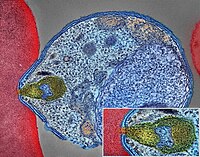
The impact of stopping and starting indoor residual spraying on malaria burden in Uganda
Sign Up to like & getrecommendations! Published in 2021 at "Nature Communications"
DOI: 10.1038/s41467-021-22896-5
Abstract: The scale-up of malaria control efforts has led to marked reductions in malaria burden over the past twenty years, but progress has slowed. Implementation of indoor residual spraying (IRS) of insecticide, a proven vector control… read more here.
Keywords: malaria burden; impact; residual spraying; indoor residual ... See more keywords

Association between indoor residual spraying and pregnancy outcomes: a quasi-experimental study from Uganda.
Sign Up to like & getrecommendations! Published in 2022 at "International journal of epidemiology"
DOI: 10.1093/ije/dyac043
Abstract: BACKGROUND Malaria is a risk factor for adverse pregnancy outcomes. Indoor residual spraying with insecticide (IRS) reduces malaria infections, yet the effects of IRS on pregnancy outcomes are not well established. We evaluated the impact… read more here.
Keywords: indoor residual; incidence; pregnancy outcomes; residual spraying ... See more keywords

The mosquito vectors that sustained malaria transmission during the Magude project despite the combined deployment of indoor residual spraying, insecticide-treated nets and mass-drug administration
Sign Up to like & getrecommendations! Published in 2022 at "PLoS ONE"
DOI: 10.1101/2022.07.01.498466
Abstract: The “Magude project” aimed but failed to interrupt local malaria transmission in Magude district, southern Mozambique, by using a comprehensive package of interventions, including indoor residual spraying (IRS), pyrethroid-only long-lasting insecticide treated nets (LLINs) and… read more here.
Keywords: indoor residual; magude project; transmission; project ... See more keywords

Vulnerability of populations to malaria after indoor residual spraying is withdrawn from areas where its use has previously been sustained: a protocol for a systematic review
Sign Up to like & getrecommendations! Published in 2022 at "BMJ Open"
DOI: 10.1136/bmjopen-2022-065115
Abstract: Introduction With its proven effectiveness, indoor residual spraying (IRS) as a malaria vector control strategy forms one of the reliable vector control strategies, especially when at least 80% of the population is covered. However, to… read more here.
Keywords: indoor residual; withdrawn; protocol; systematic review ... See more keywords

Synergy and timing: a concurrent mass medical campaign predicted to augment indoor residual spraying for malaria
Sign Up to like & getrecommendations! Published in 2019 at "Malaria Journal"
DOI: 10.1186/s12936-019-2788-9
Abstract: BackgroundControl programmes for high burden countries are tasked with charting effective multi-year strategies for malaria control within significant resource constraints. Synergies between different control tools, in which more than additive benefit accrues from interventions used… read more here.
Keywords: transmission; control; campaign; residual spraying ... See more keywords

Evaluation of the residual efficacy of indoor residual spraying with bendiocarb (FICAM WP 80) in six health districts in Senegal
Sign Up to like & getrecommendations! Published in 2019 at "Malaria Journal"
DOI: 10.1186/s12936-019-2829-4
Abstract: BackgroundFrom 2011 to 2014, an indoor residual spray (IRS) programme for malaria vectors control was implemented in six health districts in Senegal. The main objective of the present study was to evaluate the efficacy of… read more here.
Keywords: six health; indoor residual; health districts; efficacy ... See more keywords

‘We spray and walk away’: wall modifications decrease the impact of indoor residual spray campaigns through reductions in post-spray coverage
Sign Up to like & getrecommendations! Published in 2020 at "Malaria Journal"
DOI: 10.1186/s12936-020-3102-6
Abstract: Malaria prevalence has significantly reduced since 2000, largely due to the scale-up of vector control interventions, mainly indoor residual spraying (IRS) and long-lasting insecticide-treated nets (LLINs). Given their success, these tools remain the frontline interventions… read more here.
Keywords: spray; away wall; spray walk; coverage ... See more keywords

The TIRS trial: protocol for a cluster randomized controlled trial assessing the efficacy of preventive targeted indoor residual spraying to reduce Aedes-borne viral illnesses in Merida, Mexico
Sign Up to like & getrecommendations! Published in 2020 at "Trials"
DOI: 10.1186/s13063-020-04780-7
Abstract: Background Current urban vector control strategies have failed to contain dengue epidemics and to prevent the global expansion of Aedes -borne viruses (ABVs: dengue, chikungunya, Zika). Part of the challenge in sustaining effective ABV control… read more here.
Keywords: trial; indoor residual; residual spraying; efficacy ... See more keywords

Indoor residual spraying for the control of visceral leishmaniasis: A systematic review
Sign Up to like & getrecommendations! Published in 2022 at "PLoS Neglected Tropical Diseases"
DOI: 10.1371/journal.pntd.0010391
Abstract: Indoor Residual Spraying (IRS) is one of the interventions to control the vectors of Visceral Leishmaniasis (VL). Different insecticides are used in affected countries, also in the Regional Initiative for the Elimination of VL in… read more here.
Keywords: visceral leishmaniasis; indoor residual; control; systematic review ... See more keywords

Evaluation and Comparison of Spray Equipment for Indoor Residual Spraying.
Sign Up to like & getrecommendations! Published in 2019 at "Journal of the American Mosquito Control Association"
DOI: 10.2987/18-6810.1
Abstract: The World Health Organization (WHO) has recently recommended indoor residual spraying (IRS) as part of a vector control strategy to combat Aedes-borne diseases, including dengue, chikungunya, and Zika viruses. Hand compression sprayers have been used… read more here.
Keywords: hudson pert; equipment; control; residual spraying ... See more keywords

Bioefficacy of Two Nonpyrethroid Insecticides for Targeted Indoor Residual Spraying Against Pyrethroid-Resistant Aedes aegypti.
Sign Up to like & getrecommendations! Published in 2019 at "Journal of the American Mosquito Control Association"
DOI: 10.2987/19-6866.1
Abstract: We evaluated the efficacy of bendiocarb (Ficam W® 80%) and pirimiphos-methyl (Actellic 300CS® 28.16%), applied to different surfaces potentially sprayable within houses during the application of a targeted indoor residual spraying (TIRS) against a field… read more here.
Keywords: aedes aegypti; residual spraying; targeted indoor; indoor residual ... See more keywords